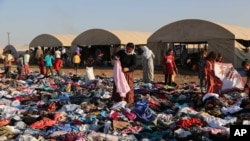The International Red Cross and Red Crescent Societies are appealing for $19 million to provide emergency winter assistance to nearly one-half million displaced people who have fled from militant Islamist attacks to Irbil and Dohuk in Iraq’s Kurdish region.
Temperatures have plummeted below zero degrees celsius in many regions of Iraq, especially in Kurdistan’s snow-covered mountainous areas where hundreds of thousands of displaced Iraqis are living.
Benoit Matsha-Carpentier, a spokesman for the International Red Cross Federation, tells VOA these people do not have access to food, to water, to health and to many other basic services. He says they are unprepared and ill equipped to survive the winter frost.
“Conditions are very, very difficult…A lot of them have been moving quite a couple of times, so a lot of them have lost all their assets," said Matsha-Carpentier. "Whether they have lost them in the move or they had to sell them because they did not have any money to just buy basic necessities or even food. A lot of them do not have proper shelter, so that is one of the activities that we will be focusing on.”
Matsha-Carpentier says health is one of the biggest concerns. He says the health infrastructure in the region has completely broken down and must be restored otherwise these vulnerable people are at great risk of acquiring illnesses. He says they are completely defenseless. They have no means of fighting off disease and other health problems.
“It is an accumulation of issues," said Matsha-Carpentier. "When people do not have food, they do not have shelter. They do not have access to health. Of course, they are much more at risk of illness because of all these factors. So, we have to make sure that they have a roof on their heads, and that they can eat at least a proper one meal a day and that they can have access to water, which is a big gap.”
Nearly half of Iraq’s two million internally displaced people have fled to the Kurdish regions. The others are living in the central and southern regions of the country, many of them in areas controlled by the so-called Islamic State.
Since the fighting erupted, Matsha-Carpentier says more than 4,000 volunteers of the Iraqi Red Crescent Society have been at the forefront of relief operations throughout the country. He says they are providing basic items, first aid and psychological support to those affected by the violence.
Matsha-Carpentier says money from the $19 million emergency appeal will allow this army of humanitarian volunteers to continue to respond to the vital needs of the hundreds of thousands of homeless people who often are living in life-threatening conditions.
Emergency Needs Grow in Iraq as Winter Bites
- By Lisa Schlein

GENEVA —



